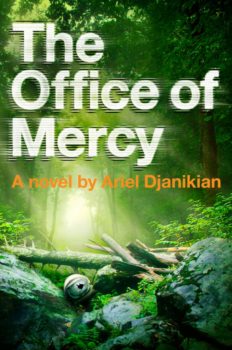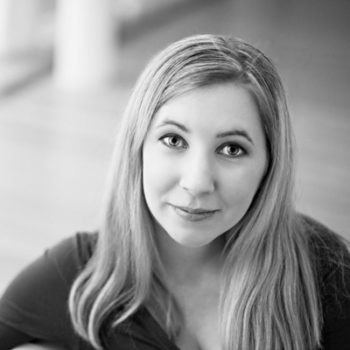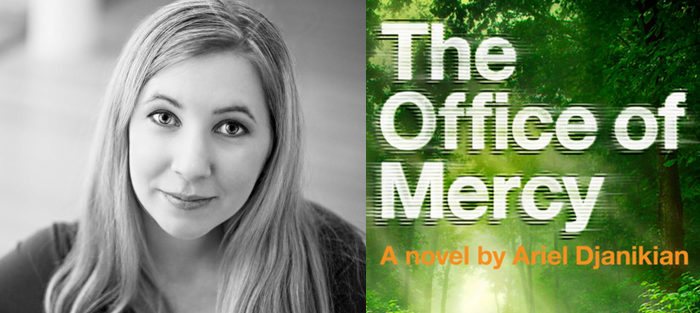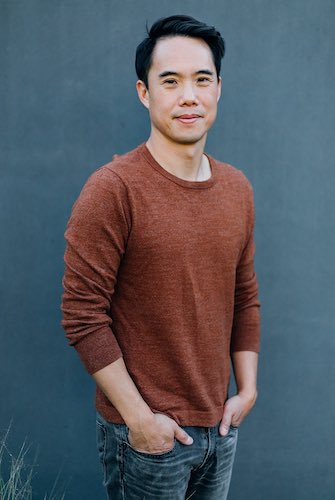In addition to creative writing, Ariel Djanikian has studied chemistry and philosophy—oh yeah, she was a Fulbright scholar, too—and all of that shows in her debut novel, The Office of Mercy (Viking). But don’t get me wrong: The Office of Mercy is no dry, dense, Novel Of Ideas. Its heroine, a young woman named Natasha Wiley, lives in a futuristic settlement called America-Five. Inside America-Five, everything seems perfect: there’s plenty of food, everyone has a job, and no one ever dies. Outside America-Five lies a post-apocalyptic wilderness, peopled only by a few roaming bands who survived the “Storm” that destroyed all other civilization. Natasha works in the aforementioned Office of Mercy, where her job is to—
But wait. I don’t want to spoil the pleasure of discovering the horrifying downsides of America-Five, the struggle Natasha comes to face, and how very murky the concept of “mercy” becomes. Suffice it to say that The Office of Mercy raises big questions about science, morality, and otherness—at a page-turning clip.
That combination of big ideas and sharp, beautiful writing is what first drew me to Ariel’s work when she and I met some years ago in the MFA program at the University of Michigan. As a fellow science-nerd/creative-writer and writer/new-mom, I had a lot of questions for her about her novel, her writing process, and the writing life when we chatted via email in early 2013.
Interview:
Celeste Ng: First, the obvious question—where did the idea for The Office of Mercy come from?
Ariel Djanikian: The short answer is that I was living in Wisconsin, staring out at the snow, when I imagined a shimmering Dome peeking out from this lush, dense forest. I remember thinking, Yeah, I could spend some time there! Pretty soon afterward, the world of the settlement united with Natasha and Jeffrey and the complicated history they have together. I think that was enough to get going, a tightly layered vision that’s so hot with emotion and complication that you can’t see through to its core. At least not until you sit down and write it.
The other part of the answer is that the themes of the book come from my life. My father is Armenian, and I’m first generation American on that side. Discussions of genocide are familiar to me—as are stories of exile. It’s probably also significant, in terms of parallels to the book, that the Armenian Genocide isn’t officially acknowledged by the US. So it’s a genocide that doesn’t always go by that name, like what takes place in The Office of Mercy.
From a quick plot description, the book could easily be pegged as straight-up sci-fi. But from the first sentences, it’s clearly “literary” fiction—the careful writing, the focus on character and detail. How did you try to balance the sci-fi elements with the “literary” elements?
Well, I think any book worth reading needs to be carefully written. And that’s not necessarily an issue of genre. Ray Bradbury’s prose is wonderfully lyrical, and Philip K. Dick wrote with searing precision and psychological realism. But to answer your question—I grew up reading both classic sci-fi and literary-canon-type novels. My favorite book as a child was A Wrinkle in Time. You emulate the type of writing you love. I guess at a certain point the mess of language and stories amalgamates into the ideal type of book that you want to write.
It’s becoming increasingly common—or maybe just more acceptable—for so-called “literary” fiction to borrow elements from “genre” fiction—Colson Whitehead’s Zone One, for example, or even Blindness by José Saramago or The Road by Cormac McCarthy. Why do you think this is happening? Why do you think there’s such a fascination with post-apocalyptic and dystopian worlds?
All really good books! And powerful each in their own way. Something that’s easy to lose sight of is that dystopian literature has been around for a while. We, 1984, Brave New World, and Anthem were written over sixty years ago; even Oryx and Crake has been around for a decade. And in America I think it’s fair to say that dystopia is part of our Puritan beginnings—just take a look at some early fire and brimstone sermons… But, yes, dystopia does seem to be in the spotlight again. So why now? My guess is that everyday life feels in flux, technology changes fast, the political atmosphere of the country jumps back and forth between two poles. Probably all that change makes the future feel up for grabs.
I just realized that all the books I mentioned above—the first three “literary post-apocalyptic” books that came to mind—are written by men and feature male protagonists. Obviously, the opposite is true in The Office of Mercy! Do you think there’s a bit of a gender divide (or gap) here?
There’s definitely a gap, but I hope it’s closing. I still remember being twelve or thirteen and getting caught in the science fiction aisle of a bookstore by a group of school friends. One of the girls said, very beneficently, “Oh, you don’t want to be here.” From what I can tell, that atmosphere is changing. Which it should! There’s nothing inherently “male” about sci-fi or stories set in the future. So, yeah, it’s possible that we might have enough young, female readers and writers balancing things out in another generation or two. Girls and women are certainly buying and reading books in healthy numbers, so I’m cautiously optimistic that the divide you mentioned won’t be there for long.
 Let’s talk a little about the book itself. The question of morality in the world of The Office of Mercy is actually quite complex. Without giving too much away, Natasha makes some decisions that will probably have readers shouting, “No! Don’t do that! Are you crazy?!” Do you think of her as the heroine of the story? Should the reader?
Let’s talk a little about the book itself. The question of morality in the world of The Office of Mercy is actually quite complex. Without giving too much away, Natasha makes some decisions that will probably have readers shouting, “No! Don’t do that! Are you crazy?!” Do you think of her as the heroine of the story? Should the reader?
I do see her as the heroine. I hope the reader will too. Natasha finds herself in a few tough situations, and torn between two groups of people she cares about, but she’s working hard to do the right thing. I also respect her simply because she was raised with one set of beliefs and—by the power of her own feelings and insights—she comes to see the world differently. I’m always impressed by people who can do that. She’s also brave and persistent, even when matched against very formidable forces in her society.
The book deals very explicitly with questions of morality and ethics. The citizens’ lives are theoretically ruled by the settlement’s Ethical Code, and of course the existence of the Office of Mercy itself raises huge moral questions as well: what makes a worthwhile life, and who (if anyone) has the right to decide who lives or dies. Even though this takes place in an alternate universe, the links to contemporary issues—euthanasia, abortion, questions of political and cultural dominance—are pretty clear. You have a background in science and philosophy—how did all of those feed into your writing of the book?
During college I worked in a biochemistry lab that was building scaffolds for drugs that could self-assemble inside a cell. The idea was to keep the scaffold parts small enough to pass through the cell membrane, but large enough so that, when put together, the drug could bind more specifically to proteins—and the drug would have fewer side effects. I was never a standout in science, but I was very enthusiastic about the research process. I loved the optimism and relentless can-do spirit that permeated the science buildings. Within America-Five, I definitely tried to capture that aura. I also took a lot of satisfaction in assuming the perfection of scientific discoveries that I never had the patience to put my head down and work toward in real life!
But in a larger sense, science and philosophy and writing are tied together for me because they’re all pathways for investigating what it means to be a human being. At their best, they’re also pathways driven by curiosity. I’m most at home with fiction and poetry, because they take emotion and affect into account. But I think there’s a lot of overlap between the questions and goals of each one of those fields.
I was really touched by the Zetas—as the next generation, collectively produced by the settlement, they represent all that the citizens hope for the future. In reading the book as a mother, the descriptions of the Zetas and the citizens’ feelings for them really stuck a chord with me. You had a daughter this past year. When you were writing this book, were you already thinking about parenting and what it would be like to raise a child? Has becoming a parent changed your view of the world, or your writing process?
The passages about the Zetas were written before my daughter was born, but yes, at the time I was beginning to think about having children. I’m glad you were touched by the Zetas—I feel strongly about them too! For me they’ve always been an essential presence in the book in part because that’s one of the constants—from culture to culture, from one historical moment to another—the hope that we see in children. They come into the world and suddenly all these new possibilities spring alive, all these shifts happen. It’s exciting and scary too—because it changes our own roles so drastically.
In terms of writing: I used to think that my writing and family life could each maintain a separate existence, but of course that’s not how it works. The unique thing about being a writer, as many people have said, is that everything counts as research. Having children or falling in love or leaving home or even the really terrible things that happen to us in our lives—all the things that deepen our emotions might deepen and strengthen the writing too. As for day-to-day scheduling, I’ve had to give up my mornings and adapt to being nocturnal.
The novel is very different, in topic and style, from your other writing I’ve seen (for example, your story “Calling Mrs. Gallagher”). Was it hard to shift gears and write such a different book? Did the writing process feel different?
 Yeah, it was different. I started off writing short stories, and ones that were fragmented and often experimental in style. For a while I thought it was because I didn’t like writing plot (by plot I mean a movement in the story that relies strongly on event-to-event causalities, rather than on looser associations). But that didn’t make sense. I love plot. Both The Murder of Roger Ackroyd Agatha-Christie-type zingers and the ones that unfold more slowly, like the travel story that forms the backbone of As I Lay Dying. When I started working on novels, I realized that I’d been writing in fragmented structures partly out of a sense of constrictedness. There hadn’t been enough room in thirty pages for the type of stories I tend to think up. So at that point the look of my writing definitely shifted. Certain things stayed the same, though. Most people have a ring to their prose that remains pretty steady. My grandfather recently gave me a box of his old letters, and you can hear the same wry, convivial tone in his writing from age fifteen to ninety.
Yeah, it was different. I started off writing short stories, and ones that were fragmented and often experimental in style. For a while I thought it was because I didn’t like writing plot (by plot I mean a movement in the story that relies strongly on event-to-event causalities, rather than on looser associations). But that didn’t make sense. I love plot. Both The Murder of Roger Ackroyd Agatha-Christie-type zingers and the ones that unfold more slowly, like the travel story that forms the backbone of As I Lay Dying. When I started working on novels, I realized that I’d been writing in fragmented structures partly out of a sense of constrictedness. There hadn’t been enough room in thirty pages for the type of stories I tend to think up. So at that point the look of my writing definitely shifted. Certain things stayed the same, though. Most people have a ring to their prose that remains pretty steady. My grandfather recently gave me a box of his old letters, and you can hear the same wry, convivial tone in his writing from age fifteen to ninety.
Okay, now for some fun questions. What’s one scene (or sub-plot of the book) you took out?
I tend to write short and fast on the first go. I get the essential stuff down, then go through adding layers and drawing out descriptions. So the process is much more about addition than subtraction. With that said, I did have one scene of Natasha at a routine bioreplacement appointment. I liked it because it got more into the nitty-gritty of the cell replacement therapies and organ replacements that keep the citizens from aging the way we do. But the scene slowed down the action too much, and there was a better reason for going to the medical wing later on, so I cut it. That’s a really good question. I always wonder about the lost bits from other people’s books.
If The Office of Mercy were being made into a movie, who would you want to play Natasha? Jeffrey? The Mother?
Oh, this is hard! How about Helen Mirren as the Mother, Bryan Cranston as Jeffrey, and someone like Anne Hathaway, Zoe Saldana, or Natalie Portman as Natasha. I’ll also throw in the politically savvy and lovable Kal Penn as Raj.
What have you been reading lately?
Hilary Mantel’s Bring Up the Bodies. Right on the heels of two other stellar British novels: NW and The Sense of an Ending.
What’s on your desk (or in your writing space)?
I usually work at a little table in a bookstore or coffee shop, with no clutter and no distractions. Sometimes I wear neon green earplugs, which I’m sure looks ridiculous. At home, my desk is clear except for a lamp, pens, and the last few pages of whatever I’m writing. (I write most drafts by hand so my laptop lives elsewhere!) I have books at my back and a window to my right, but my desk faces the wall. Occasionally that’s a very good thing: to have the choice be between staring at that wall or writing the next sentence.
And finally: what are you working on next?
A prequel to The Office of Mercy. It’s the story of what happened during the Storm, who did it and why. I’ve had the basic outline sketched out for years, so it’s been fun to finally come back to it.

Ariel Djanikian’s Writing Desk
Links and Resources
Read Ariel’s story “Calling Mrs. Gallagher” in L Magazine.
In the Paris Review Daily, Ariel writes about an unforgettable night class in existentialism—and its unforgettable teacher.
Visit Ariel’s author website or follow her on Twitter for more info about the novel, news, and events.






